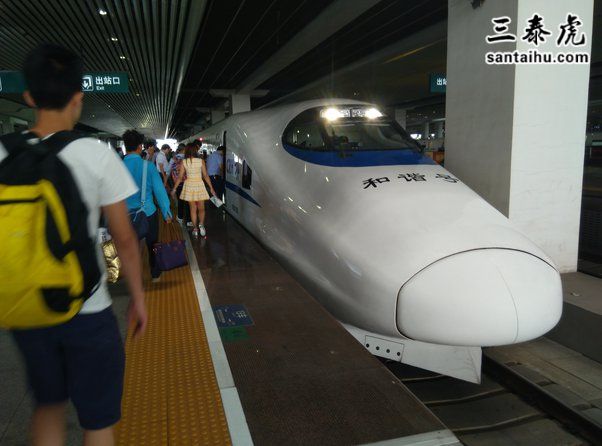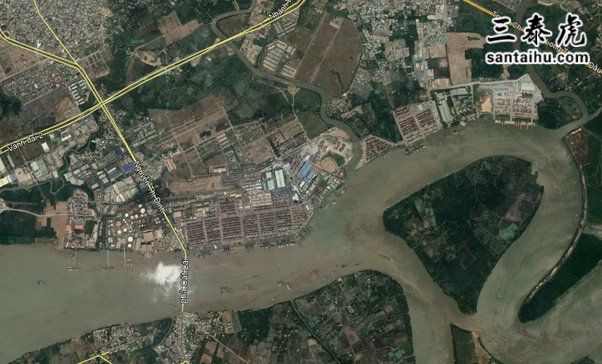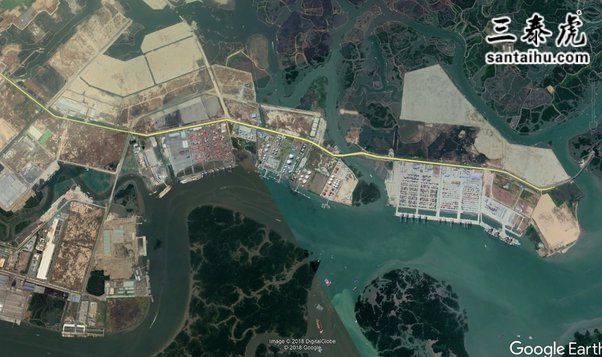Why does Vietnam now want China to build its domestic high-speed railway network after talking cooperation with Japan for a long time (June 2023)?
为什么越南在跟日本洽谈许久后,又想让中国修建高铁了?
以下是Quora网友的评论:
Felix Su
It was stupid of Vietnam’s government to ask the Japanese to build their HSR.
If your largest trading partner is China and your HSR doesn’t connect to China then it has limited utility. That means no passenger service to and from China. No freight service to and from China. It was simply idiotic.
The whole point of having HSR is not only to make your nation’s transportation easier to to also connect to other nations to drive business.
越南政府请日本人为越南修建高铁,实在是很蠢。
如果你最大的贸易伙伴是中国,而你的高铁又没有接通到中国,那么高铁的用途就十分有限。这意味着越南既没有往返中国的客运服务,也没有往返中国的货运服务。这真的很蠢。
修建高铁不光是为了提高本国的交通便利度,最好还能接通其他国家,推动商业发展。
Now that Laos has connected to China, their economy went up dramatically. And Laos will connect to Thailand, Cambodia, and Myanmar. This will bypass Vietnam as Chinese and the other nations can do business much easier so that is what they will do.
Vietnam does not have any advantages that the other nations don’t have.
现在老挝已经和中国联通了,他们的经济因此突飞猛进。老挝还会接通泰国、柬埔寨和缅甸的铁路。这样他们就会绕过越南,因为中国和其他国家做生意越来越便利了。
越南就不再拥有其他国家所缺的优势了。
If Vietnam had not connected to China then that is essentially an isolated railroad track. And like all isolated railroads in the past, it will eventually die off.
What I am surprised by is that they actually figured it out and changed their minds.
如果越南没有和中国联通,那么越南的高铁归根结底就是一条孤立的铁路,而且早晚会像以往所有孤立存在的铁路一样走向消亡。
不过我挺惊讶的,越南竟然想通了这一点,改变了主意。
Goodi Shang
The Japanese are well aware of the serious corruption in Vietnam and often break promises. If the Japanese undertake the construction of the Vietnam high-speed railway, they are likely to not receive compensation.
日本人非常清楚越南有多么腐败、不守信用。如果日本承建越南高铁,他们很可能会白忙一场。
Chinese construction companies have encountered the most absurd default in Vietnam. China has learned its lesson and will no longer undertake infrastructure projects in Vietnam. Vietnamese people know this.
中国建筑公司在越南就遭遇了极其荒唐的违约行为。中国已经吸取了教训,不再承建越南的基础设施项目。越南人对此也心知肚明。
Of course, there may be external events, but aid based on political purposes may still occur.
Another hardship of carrying out infrastructure projects in Vietnam is the corruption of Vietnamese officials.
当然了,出于政治目的考虑的援助还是可以照常进行的。
在越南开展基础设施项目建设的另一个困难是越南官员的贪污腐败。
Anyone in Vietnam can stop the construction process, causing them to stop construction for a few days in order to receive a bribe of tens of yuan, resulting in losses of millions of dollars. If the Chinese construction team resists, there will be more losses.
在越南,任何人都可以叫停施工过程,导致项目停工,他们收取数十元的贿赂,却造成数百万美元的损失。如果中国施工队不遵从,损失只会更大。
Jesuan Wu
Because China offers a better option than Japan for Vietnam.
China’s moving up the value chain and the US’s trade war with China have Chinese companies moving some of their manufacturing to Vietnam. This means that China and Vietnam have become more interconnected economy wise.
因为中国为越南提供的条件比日本更好呗。
中国开始向价值链上游移动,加上中美贸易摩擦,中国企业被迫将一些工厂转移到越南。这意味着中国和越南在经济上越发紧密相连了。
While Japan would have absolutely no problem building a high speed rail for Vietnam, economically it would be stupid not to have such rail connect with neighboring countries, including China, to benefit from the already booming China-Vietnam trade.
虽然日本为越南修建高铁也绝对没问题,但从经济效益上讲,中越贸易蓬勃发展,如果越南不跟包括中国在内的邻国接通高铁网络,那就是愚蠢到家了。
Now that China has completed its rail connection with Vietnam’s neighbor Laos, and Thailand happy to incorporate the Chinese standard too, Vietnam sees the writing on the wall: it can have a rail system that only runs domestically with Japanese standard, or it can have a rail system that can run both domestically and internationally by going with China. From an economic stand point, this would be a no-brainer.
如今中国的铁路已经接通了越南的邻国老挝,泰国也很乐意采用中国的高铁标准,这下越南就发现了一个问题:越南可以修建一条只在本土运行的日本高铁线路,也可以和中国合作,修建一条既能在本土运行又能接通国际的高铁线路。从经济角度来看,该如何做选择简直就是明摆的事。
There’s only the security issue to consider, as different train tracks would prevent a Chinese military train from entering Vietnam, but that threat really isn’t evident these days, and there are simple work arounds like removing certain connection tracks during war time.
越南还需要考虑的只剩下安全问题了,火车轨道不同,能阻碍中国军方的列车进入越南,但目前这只是杞人忧天的威胁。越南也有一些简单的破解之道,比如在战争期间拆除某些连接轨道。
Brady Milton
China have ten times the rail building infrastructure of Japan. Their rail goes all the way to and through France. They can build better rail cheaper and quicker than anyone and they are right next door. Its a no brainer really
中国的铁路基建规模是日本的十倍。他们的铁路已经直通法国了。中国人修高铁的成本更低、速度更快,而且中国就在越南隔壁。动动脚趾头都知道该怎么选择了。
Nicole Hsieh
However, I can provide some possible reasons why Vietnam may have changed its stance on building its domestic high-speed railway network with China instead of Japan.
为什么越南改变心意,想让中国修建越南高铁了呢?我可以说说几个可能的原因:
One possible reason could be that China has offered more favorable terms and financing options for the project. China has been actively promoting its Belt and Road Initiative, which includes infrastructure development projects in other countries, and may be offering Vietnam attractive financing options to build its high-speed railway network.
原因之一可能是,中国为越南提供了更优惠的条款和贷款选项。中国一直在积极推动“一带一路”,其中就包括其他国家的基础设施建设项目,中国可能还向越南提供了极具吸引力的贷款选项来修建越南高铁网。
Another reason could be that Vietnam may be seeking to improve its relationship with China. Vietnam and China have had a history of tensions and disputes over territorial claims in the South China Sea, and Vietnam may see cooperation on a major infrastructure project as a way to improve bilateral relations and reduce tensions.
另一个原因可能是越南可能想要改善和中国的关系。越南和中国在南海领土主权问题上一直存在争议,越南可能将重大基础设施项目上的合作视为改善双边关系和缓解紧张局势的一种方式。
It is also possible that Japan may have faced difficulties in implementing the project, such as cost overruns or delays, which may have led Vietnam to seek alternative partners.
当然也有可能是因为日本在实施该项目时遇到了困难,比如成本超支或工期延误等,这可能也会使越南重新寻找合作伙伴。
Overall, the reasons for Vietnam's decision to work with China on its high-speed railway network instead of Japan could be complex and multifaceted, and may involve a combination of economic, political, and strategic considerations.
总的来说,越南决定放弃和日本合作,转而和中国合作修建高铁网,原因可能是复杂而多面的,可能涉及经济、政治和战略等多重考虑。
Richard M
They don’t want to overspend on it. I don’t think they forgot that China invaded them in 1979 and assisted and encouraged Pol Pot to raid their country before that.
他们不想为了高铁投资太多资金。我认为越南不会忘记中国在1979年曾教训越南,更不会忘记中国之前还曾帮助、鼓动波尔布特入侵越南等事实。
John Tan
Maybe it has to do with who has the proven & leading cost effective technology in this area, as well as reputation of being able to deliver on time, on budget,.
也许越南的这个选择是跟中国或日本,究竟谁在该领域确实拥有经过验证、领先全球的低成本技术以及能够按时、按预算交付的声望有关吧。
Chris Ebbert
Related
Is China's high-speed rail advanced over Japan?
It’s a much newer train and system by decades, so yes, necessarily.
Having said that, I have used both, and they are both equally fantastic. Fast, silent, smooth… lovely things.
And you’d never know the Japanese one is already a classic. It was amazing when it came out, and it still is.
中国高铁比日本先进吗?
中国高铁的列车和系统都比日本新了几十年,所以是的,中国高铁绝对比日本先进。
话虽如此,这两种高铁我都坐过,列车运行情况都很棒,快速、安静、平稳……都是好东西。
你可能不知道,日本高铁已经是世界高铁史上的经典案例了。一刚问世就惊艳全球,现在仍然十分出色。
Rene Le'Tellier
Related
How successful has China's high-speed railway system been?
From a travelers point of view, it’s a fantastic way to travel. The stations are well laid out, and the trains are quite, comfortable and the service is good. I prefer travelling by HSR rather than flying in China. Although it gets massively crowded during holiday times and it’s impossible to buy a ticket, that’s just China.
中国的高铁系统有多成功呢?
从乘客的角度来看,这是一种非常棒的旅行方式。车站布局很好,列车很安静,很舒适,服务也很好。在中国,我最喜欢的出行方式不是飞机,而是高铁。虽然假日期间高铁会非常拥挤,常常买不到票,但这就是中国。
China is blessed with a population size that makes rail travel and investment into rail highly worthwhile, for other countries such as Australia and parts of the US it’s difficult to make the financial model work.
中国得天独厚的人口规模使得铁路旅行和铁路投资非常值得,但对于澳大利亚和美国部分地区来说,这种模式就行不通。
Regarding the business model:
关于商业模式:
“The Beiing-Shanghai high-speed railway has become the nation's most profitable and convenient rail project, boasting an annual profit of 6.58 billion yuan ($983.6 million), according to data released by one of its shareholders.”
“京沪高铁已成为全国最赚钱、最便捷的铁路项目,据其股东之一公布的数据显示,其年利润为65.8亿元人民币,也就是9.836亿美元”
Stephane Mahieu
Related
Why doesn’t Vietnam have modern ports and airports but is investing on high speed railway?
Actually, Vietnam has pretty good major ports. At least the Hai Phong complex (North) and the bigger Vung Tau / TP Ho Chi Minh complex (South).
This is not Singapore of course but the Southern port is massive and expanding, with literally dozen of terminals spread both upriver near the city (Cat Lai) :
为什么越南还没有现代化的港口和机场,却开始投资高铁?
事实上,越南拥有不少相当不错的港口,比如海防港(北越)和面积更大的头顿港(南越)。
当然,这些港口比不上新加坡,但南部港口规模庞大,而且在不断扩建,在城市附近的上游(卡莱港)有几十个码头。

… and down near Vung Tau : Cai Mep / Thi Vai for containers and some private bulk terminals.
以及靠近头顿港、可以装卸货柜的盖梅/施威,以及一些私人散货码头。


Note the container terminal on the right is both under-utilised and under expansion. That’s also where the biggest vessels can berth. Cat Lai on the other hand will serve smaller ships which will later trans-ship in Singapore or elsewhere big.
请注意,右边的集装箱码头还未得到充分利用,仍在扩建中。这也是可供最大型船舶停泊的码头。另一方面,卡莱港可为小型船只提供服务,这些船只会在新加坡或其他大型港口进行货物转运。
In addition, many small terminals are scattered in between. For river barging, petrol products, bulk, etc…
另外,越南还有很多中型码头,用于内河驳船、汽油产品、散货装卸等。
Now the problem is access from factory to terminals. Most of the factories are upriver, 50–100 kms north of Cai Mep / Thi Vai. Which is far by Vietnamese standards given the road system. Barging makes it cheaper but is slower and moves with the tides.
现在的问题在于从工厂到终端的通道。大多数工厂都在上游,在盖梅/施威以北50-100公里处。考虑到越南的道路路况,按照越南的标准而言实在太远了。驳船运输成本较低,但速度较慢,且受到潮汐的影响。
So Cat Lai (upriver) remains the cheaper factory to destination solution. Which in turn can get serious congestion, both on the terminal itself and on the access road. Trucks out our factory sometimes spend up to 6 hrs to cover the last few kms. Things has recently improved thanks to a new overpass.
因此,卡莱(上游)仍然是从工厂运往目的地的较为便宜的交通方式。但这又会导致严重的拥堵,从工厂出发,卡车有时要花上6个小时才能走完最后几公里。最近新建了一座立交桥,所以情况有所改善。
In conclusion : we need roads, and not only to the ports by the way. But roads are being built very slowly - usually because the (private) land acquisition process is slower and more expensive than projected.
总而言之:我们需要的是道路,而不仅仅是通往港口的道路。但是道路建设非常缓慢—原因主要在于(私人)土地征用过程比预计的要慢,造价也更高。
Min Yan
Related
Is it feasible for Vietnam to have high-speed rail by 2050?
越南到2050年能通上高铁吗?
If Vietnam keeps its economic progress on track, then it is quite likely to already have high speed rail by 2050.
如果越南能保持经济发展的势头,那么到2050年极有可能已经拥有高铁了。
The huge Vietnamese population of 100million in a relatively small yet very long (with two huge cities at the two ends) area makes it ideal for high speed rail. Although high speed rail is very expansive and may not be a suitable transportation option for Vietnam now, it will become the best transportation option (and affordable) when the economy develops enough.
越南有1亿人口,国土面积相对较小,但地形狭长(两端各有两个大城市),所以越南是修建高铁的理想之地。虽然高铁比较昂贵,现在可能还不是最适合越南的交通方式,但只要经济继续发展,总能成为最好的交通方式(而且百姓能负担得起车费)。
此文由 三泰虎 编辑,未经允许不得转载!:首页 > 问答 » 与日本洽谈许久后,为什么越南现在又想让中国修建高铁了
 越南人如何看待被法国殖民的历史
越南人如何看待被法国殖民的历史 中国面积近1000万平方公里,只有56个民族,而越南这种弹丸小国居然有54个民族,这正常吗
中国面积近1000万平方公里,只有56个民族,而越南这种弹丸小国居然有54个民族,这正常吗 哪个国家和中国更像,越南、韩国还是日本
哪个国家和中国更像,越南、韩国还是日本 日本后悔50年前和中国建交吗,有些日本人说“如果不建交,中国还会和50年前一样穷”
日本后悔50年前和中国建交吗,有些日本人说“如果不建交,中国还会和50年前一样穷” 中国是如何超越韩国和日本成为显示面板制造业的领导者的
中国是如何超越韩国和日本成为显示面板制造业的领导者的 澳大利亚、日本、韩国等国在印度投资有什么好处,发达国家为什么要投资印度这样的发展中国家
澳大利亚、日本、韩国等国在印度投资有什么好处,发达国家为什么要投资印度这样的发展中国家 日本虽是一个小国,但很发达,印度为什么虽然大却不发达呢
日本虽是一个小国,但很发达,印度为什么虽然大却不发达呢 越南能否在不久的将来取代印尼,成为东南亚地区的霸主
越南能否在不久的将来取代印尼,成为东南亚地区的霸主